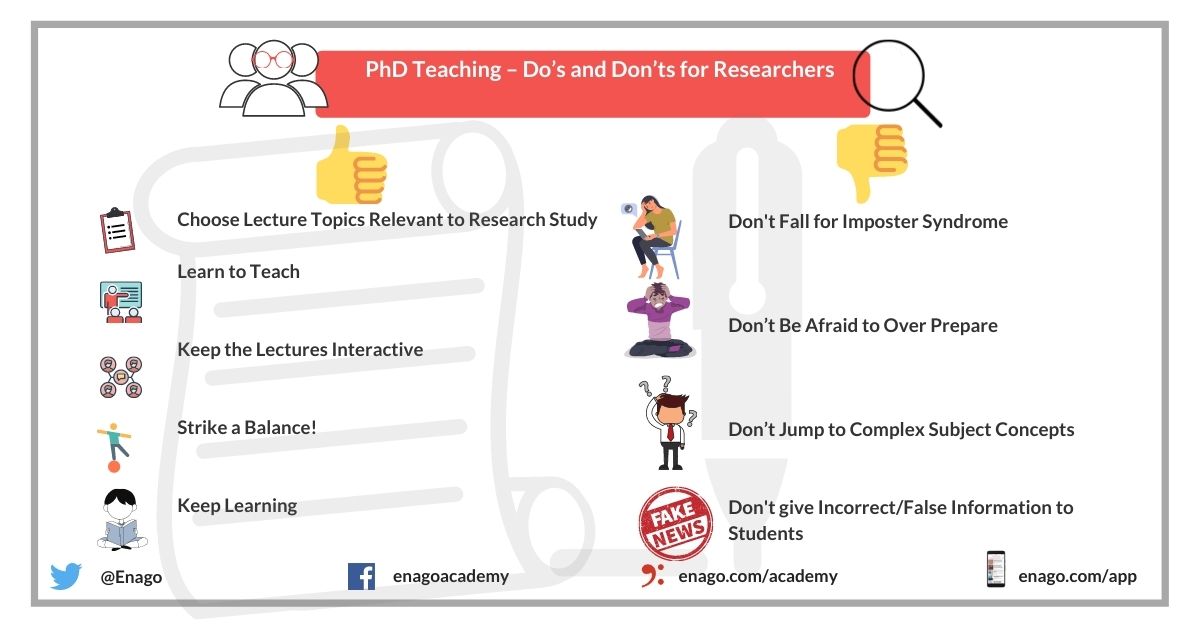PhD Teaching – Do’s and Don’ts for Researchers

You might have come across a situation wherein you were asked to teach undergraduate students along with managing your research work! You had no understanding of how to go about teaching but your PI insisted on you taking up this responsibility. Teaching during PhD is an effective way of expanding your knowledge and getting an opportunity to share relevant objectives of your research with the undergraduates, piquing their interest in the subject field.
PhD teaching can be a challenging task for researchers, especially when they never had prior teaching experience. However, teaching during a doctoral program usually begins from the second year, so the researcher will have a year of doctoral experience before taking up the teaching responsibility. Some researchers opt for a voluntary teaching opportunity to gain PhD teaching experience. For research scholars working in STEM, teaching responsibilities include laboratory-based lectures, i.e. demonstrating scientific methods and techniques for undergraduate and Masters students, administrative work, conducting seminars, and assessments.
PhD Teaching – What It Includes for Researchers
PhD teaching involves effective classroom teaching, academic advising, counselling students, participate in departmental work, develop a curriculum through assessment, attend professional conferences to explore current research, conduct and attend undergraduate and post graduate seminars and provide feedback, applied research and scholarly activity, etc. Additionally, teachers are also expected to adhere to academic policies and actively participate in collecting assessment data and work assignments.
Mostly academic teaching is a dreaded term for doctoral fellows because it appears as a time consuming additional activity. Researchers usually wish to avoid external responsibilities in an attempt to provide undivided attention to their research objectives. However, PhD teaching can be an added advantage for researchers.
PhD teaching benefits researchers by –
- Improving their presentation skills
- Refining their subject knowledge
- Giving researchers an opportunity to impart their research knowledge
- Increasing their ability to resolve queries raised by students.
Teaching Undergraduates is a Challenge for Researchers
Teaching needs a variety of skill sets ranging from creating a lesson plan, instructing students, working with administrators to counseling students. While researchers are busy building their academic reputation by publishing, obtaining funds, and demonstrating research impact, teaching-related activities (often neglected) are an effective way to demonstrate a researcher’s development.
Academic teaching activities instill skills like effective oral communication, leadership quality, self-reflection to adapt and refine techniques, and time management to balance teaching alongside PhD study. However, researchers are caught up in conducting their independent research work and self-management, which makes it difficult for them to hone these skills.

Ways to Improve PhD Teaching Skills
1. Choose Lecture Topics Relevant to Research Study
A researcher should cater to the queries of the students, but taking up a subject matter that the researcher is an expert in, helps the research scholar prepare an effective lesson plan. Furthermore, it helps in effectively responding to the queries raised by students.
2. Learn to Teach
For scholars who have never conducted lectures, the first one can be daunting! However, attending workshops on how to teach can help researchers improve uncertainty and boost confidence to teach. There is always a first time to everything. Your key to a successful lecture delivery is being well prepared.
3. Keep the Lectures Interactive
Always allow students to speak up their thoughts about the topic of the lecture. This helps the you weave a story or a real life experience around the discussion, initiated by students. Moreover, it makes students feel they are equally involved in learning a new topic. Share your professional experiences with regards to your research work. This will help students get insights on how the practical field of their theoretical knowledge functions.
4. Observe Peers and Accept Feedback
The best way to learn PhD teaching techniques is to observe the supervisors, peers, and other departmental staff in their roles. This may help researchers follow different teaching techniques and new ways to engage students in the course work. Furthermore, the feedback received from supervisors or peers help researchers in getting a different perspective towards teaching and its techniques.
5. Strike a Balance!
When teaching alongside PhD, it is important to strike a balance between the two. Teaching activity is different from working on one’s research objectives. Research work is more independent and requires discussions only with the supervisor. While PhD teaching is completely based on communication skills and effective interaction. What matters the most is, how a researcher strikes a perfect balance between the two. Researchers can share their experiences from the research project and build their presentation skills from their teaching activity.
6. Keep Learning
Finally, after following and adapting teaching techniques and getting familiar with the balance between PhD research and academic teaching, you may face occasional disappointments and frustration, or even struggle to make impressive lesson plans. However, perseverance towards achieving your goals is the key to excel as an academic teacher.
Avoid these While Academic Teaching
Ignore the Imposter Syndrome
Imposter syndrome is a feeling of hiding one’s secret incompetence and insecurity and thinking they don’t have sufficient knowledge the research requires. This is an extremely common issue in early career researchers. It is essential to believe that you have enough expertise to be teaching university students.
Don’t Be Afraid to Over Prepare
Initially, you may want to put in extra efforts in creating the lesson plan and doing an in-depth study. This is a plus for researchers who are stepping into PhD teaching for the first time. Being over prepared will help researchers answer the queries raised by students. However, one must ensure of not overwhelming the students with jargon information.
Don’t Jump to Complex Subject Concepts
Students may not understand the complex concepts taught in the lecture, unless basic concepts are explained. Researchers must take their new class by refurbing the students’ knowledge on basic concepts; this will also be beneficial for them and their PhD study.
Imparting Incorrect/False Information to Students
It is necessary to thoroughly prepare for the lecture. This will allow you to impart correct information. There are scenarios wherein a researcher is not able to answer the query raised by a student, and the researcher might give an irrelevant answer. However, it is better to be honest than giving students false information and misleading them.
Academic teaching can be a daunting process for the first time, but it really gives an impactful career growth for PhD graduates. What do you think about PhD teaching? How did you strike a balance between research and teaching career? Let us know in the comment section below.










Useful Content
good article
thanks very much for this useful article, stay blessed.